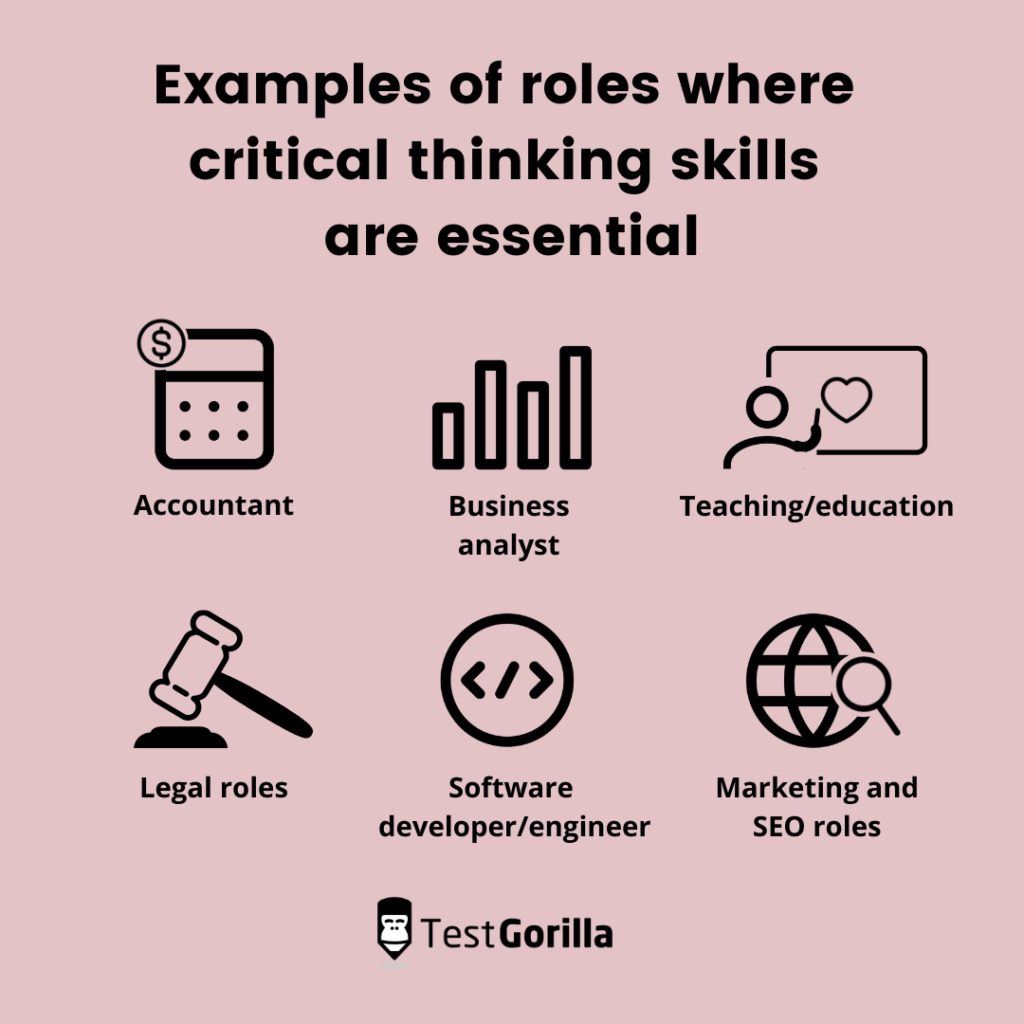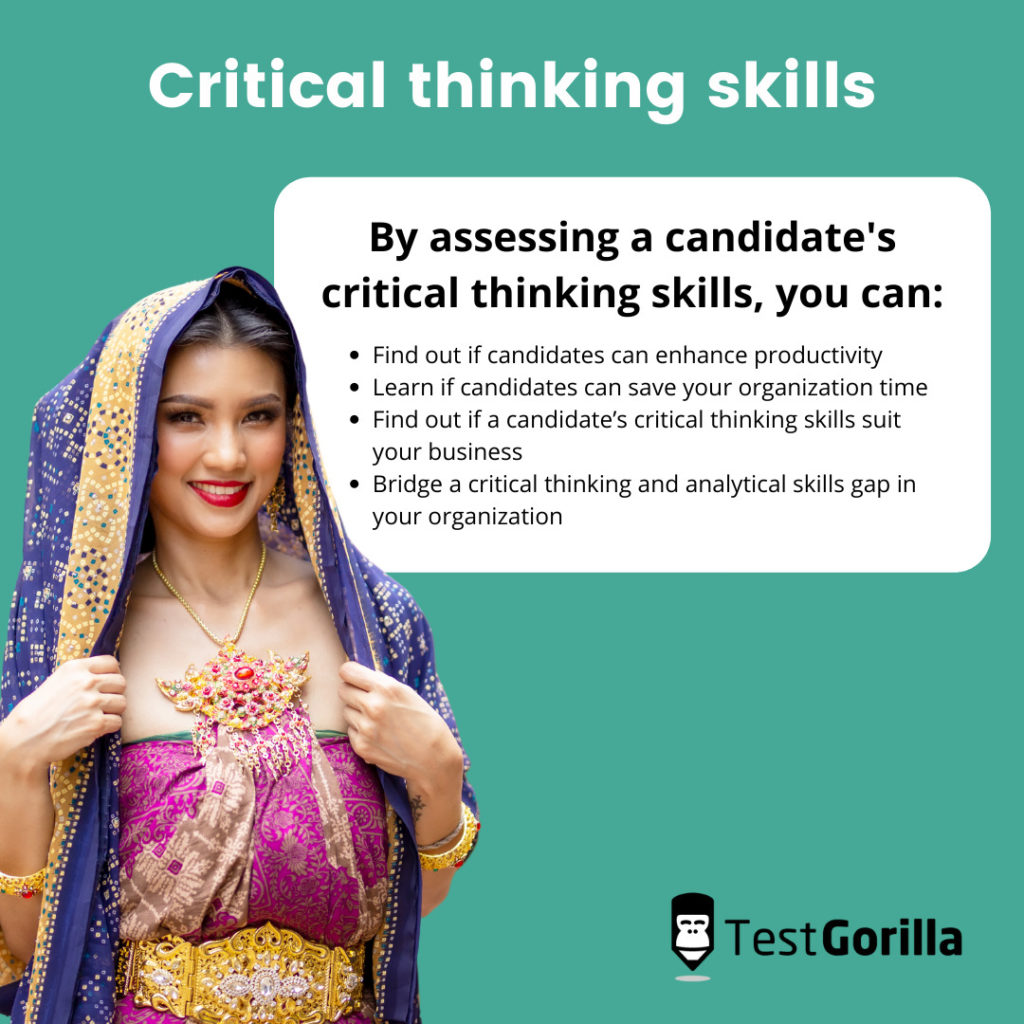It’s not always easy to assess critical thinking skills, but there is a solution – a reliable critical thinking skills test. It’s the ideal way to get accurate data on a candidate’s critical thinking skills as a whole, as well as a wide range of individual skill sets in your candidates.
TestGorilla’s comprehensive critical thinking skills test can help you determine whether your candidates can evaluate complex challenges and solve problems using a critical thinking approach. Discover more about how to assess critical thinking skills below.
Table of contents
What does critical thinking mean?
Top critical thinking skills indicate that a candidate or employee will be able to gather all the information needed for a task or project, objectively assess data, and conclude how to complete tasks based on what they have learned from their research.
Although more information may appear to be useful when solving tasks, what’s essential is having the right facts and data; more can sometimes equal less in terms of deductive reasoning because some facts may be irrelevant in certain situations. As a result, critical thinking also entails filtering out irrelevant data.
Critical thinking skills are made up of a group of sub-skills that help candidates solve problems and complete tasks, such as research and analytical skills, assessing and interpreting information with critical judgment skills, sharing findings with excellent communication skills, and problem-solving skills in the workplace.
Using research and analytical skills to gather and conceptualize data
Candidates with exceptional critical thinking skills should first be able to gather the necessary information for the task at hand. This might include consulting various sources of information and conducting research on the project.
Assessing and evaluating information with critical judgment skills
To approach the task, candidates and employees will need to evaluate the information they’ve gathered using the appropriate approaches.
Before taking any action, they should objectively evaluate the validity of the research they have gathered to ensure the data is reliable and accurate using objective, critical judgment skills.
For instance, before writing a blog post or article, content writers should evaluate the credibility of their sources, which helps them overcome the challenge of producing a factually accurate piece.
Using data inference to make complex decisions and make conclusions
Candidates and employees must also be able to recognize patterns, trends, or correlations in data to resolve complex problems and arrive at a conclusion.
For example, learning from the meanings of qualitative or quantitative data related to the marketing funnel, or analyzing conversion or click-through rates to determine how to optimize a marketing strategy.
Sharing findings and receiving advice with communication skills
Employees must be able to communicate effectively to inform their colleagues of their findings when solving problems. This requires not only clear verbal communication skills but also the ability to listen and interpret the advice of colleagues when discussing the next steps needed to solve the problem.
For instance, if your software development team is looking for ways to fix and roll out a cloud license service, team members will need to share what they’ve learned about their clients and listen to other team members to fix the issues and make the service available.
Approaching the problem with problem-solving skills
To solve problems, candidates and employees will need problem-solving skills as part of their critical thinking mindset. This will include:
Breaking the problem down into smaller parts
Using analytical and critical thinking to solve the problem
Implementing the appropriate strategies to address each of the smaller issues
Why candidates’ critical thinking abilities should align with your industry
Since each industry requires different critical thinking sub-skills. The strongest candidates will have critical thinking abilities that are relevant to the industry in which they work. Your candidates should demonstrate that they have the necessary critical thinking sub-skills for the vacant position.
Here is a rundown of several industries and the critical thinking skills they require.
Accountant positions
Accounting candidates must have attention to detail to spot anomalies in figures, as well as critical thinking skills to interpret the story behind the numbers.
They should also be able to use critical thinking and deductive reasoning to understand the causes of numerical anomalies and devise strategies to solve them.
Business analyst roles
Data inference and communication skills are two critical thinking sub-skills that business analysts should possess. Candidates for these positions should be able to make critical decisions and provide feedback to business leaders that can shape the future of the company.
They should also have critical judgment skills that allow them to make crucial decisions to improve the company’s performance.
Teaching and education jobs
Teachers and educators must be able to think critically to teach and mentor students. If you’re hiring a teacher, can your candidates effectively handle the process of understanding your students’ learning styles, and can they come up with strategies to deliver and teach lessons that are easily understood?
The problem-solving sub-skill is also important in this field when dealing with behavioral issues in the classroom. Teachers will need to identify the cause of behavioral issues and implement methods to resolve and address them using critical thinking dispositions.
They may also be involved in teaching critical thinking skills or cognitive skills to their students, which necessitates a well-planned teaching strategy.
Legal roles
As stated in Lawyer Monthly, critical thinking for legal positions entails remaining objective when inferring case-related information and comparing the information you have with the facts of relevant cases.
Legal cases also require more than just a recount of the facts related to the case. Candidates must be able to use critical thinking skills to evaluate the strengths of their arguments and present them persuasively and coherently to solve cases.
Software developer/engineer positions
Switchup emphasizes the importance of critical thinking skills for software developers, explaining that solving problems as they arise is made possible with critical thinking.
Two critical thinking sub-skills for software developers are excellent organizational and time management capabilities, as well as problem-solving abilities.
Can your software developer candidate create successful software solutions using the data provided to them? Can they effectively communicate with their team members to efficiently resolve errors or bugs in their code?
Marketing / SEO roles
Candidates for SEO positions must be able to conduct ongoing keyword searches and expand on keyword opportunities. Part of this involves researching keywords related to the articles produced by the marketing team and expanding on keyword clusters which also requires critical thinking.
The best insights on HR and recruitment, delivered to your inbox.
Biweekly updates. No spam. Unsubscribe any time.
Assessing critical thinking skills with skills tests
Because you’ll need to look for several critical thinking sub-skills in candidates and employees, here are four steps you can take to assess them with critical thinking skills tests and make the process easier.
Choose from a selection of skills tests to create an assessment and assess your candidates’ critical thinking skills. These might include:
Part of a critical thinking assessment involves requesting candidates to decide on the validity of a conclusive statement by using a set of information and evidence. Look for candidates who recognize which conclusions are linked to the evidence, and which are not; those that can differentiate between these two have top critical thinking skills.
During a critical thinking skills assessment, candidates will be expected to deduce the strength and validity of a set of arguments. Can your candidates deduce which of the arguments adequately support the main statement, and which fail to do so?
Use the results of this part of the assessment and make comparisons between candidates to recognize which candidates have the best critical thinking skills.
How skilled are your candidates at evaluating assumptions? This is another way to assess critical thinking skills using a skills assessment. Candidates who can use deductive reasoning skills to deduce whether an assumption is true have the best critical thinking skills.
Use the results to generate interview questions and invite candidates to the next round.
What are the benefits of using a critical thinking skills assessment?
There are four major advantages to using a critical thinking assessment to test a candidate’s or employee’s critical thinking ability:
Assess critical thinking skills to find out if candidates can enhance productivity
Critical thinking can make a difference in communication and, as a result, productivity in the workplace. For this reason, knowing which candidates have the required critical thinking skills that can boost productivity is crucial; it’s one reason why assessing critical thinking skills is beneficial to your business.
Evaluate critical thinking to learn if candidates can save your organization time
Can your candidates use critical thinking skills to save your organization time when completing a project or task? Assessing critical thinking skills is beneficial as it helps you find out if candidates or employees are capable of this.
Assessing critical thinking skills with a timed critical thinking assessment is also beneficial as you’ll learn which candidates are the strongest for your organization. Candidates who can correctly solve these challenging deductive reasoning questions within a shorter time than others can potentially help your business save time.
Find out if a candidate’s critical thinking skills suit your business
Since you’ll find out if a candidate’s approach to critical thinking suits your organization by assessing their critical thinking skills, use a critical thinking assessment to help you achieve this for various roles – keep in mind that 75% of professions describe critical thinking as a required skill.
If you’re hiring for many different positions within your organization such as legal secretary roles or lawyer positions, and they all require critical thinking skills, analytical skills, or deductive reasoning abilities, a critical thinking skills test will rigorously test your candidates for each of these particular skills in your business.
Bridge a critical thinking and analytical skills gap in your organization
The University of Massachusetts suggests that there is ample evidence that critical thinking can be taught, and assessing critical thinking skills can help with this. In the context of the workplace and skills testing, employers can use critical skills test results to assess the baseline of their employees’ critical thinking and analytical skills.
They can then plan towards suitable training sessions to enhance their analytical and critical thinking skills, which is why assessing critical thinking skills is beneficial.
For instance, to enhance critical thinking skills, teach your employees to:
Weigh up the pros and cons of a situation
Conduct the right research
Break down projects into smaller sections
Double-check a potential solution to a problem
Use TestGorilla’s critical thinking tests to hire with confidence
There’s no denying that critical thinking tests can help you make better hiring decisions. However, keep in mind that there are several sub-skills to consider and that the specific role you’re hiring for will require a distinct set of critical thinking sub-skills.Critical thinking tests can assist you in hiring talent with the right critical thinking skills for your organization. Evaluating critical thinking doesn’t have to be complicated. Hire with confidence by checking out TestGorilla’s critical thinking tests and hire the best, faster and bias-free.
You've scrolled this far
Why not try TestGorilla for free, and see what happens when you put skills first.
















